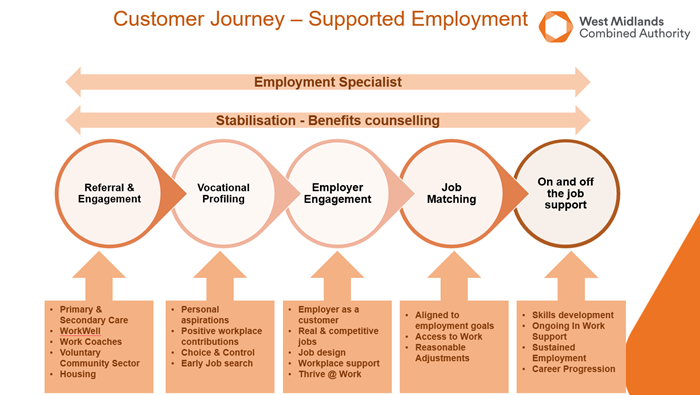The new supported employment programme, expected to launch in August 2025 will focus on young people aged 18-24 (16+ by exception) in Year 1, 2025 – 26
- Expected to support 950 – 1400 Young People in year 1
- Support for young disabled residents, residents with long-term health conditions, and other agreed disadvantaged groups with complex barriers to sustain work through delivery of supported employment through delivery of 2 evidence-based Employment Support models:
- Individual Placement Support (IPS), support is integrated with primary and secondary health care services at a physical level. This model embeds work as a health outcome for customers with moderate to high levels of need e.g. mental health/physical health
- Supported Employment Quality Framework (SEQF), support is integrated alongside community support including family with a deeper level of support for customers with a higher level of need
- For year 1 (2025-26) WMCA have adopted a Local Authority (LA) first approach in respect of the delivery model, giving LAs the option to deliver directly to their residents, or where unable to directly deliver work in partnership with the WMCA to commission appropriate interventions.
Supported employment is different to traditional models in that it focuses on placing participants into work at the earliest opportunity and provides ongoing support to help them succeed. This intensive one to one support ensures participants can start working quickly while receiving the necessary assistance to overcome barriers.
Supported Employment helps individuals gain employment but also empowers them to maintain their jobs and thrive in the workplace.
Customer Journey
Young people accessing Connect to Work will undertake a place, train and maintain model of support with support available for up to 12 months. Both IPS and SEQF supported employment provision provides a journey to employment for residents which is built around the 12 values of supported employment.
The below model indicates a supported employment journey and the key interventions a young person undertaking Connect to Work provision will access, supported by an Employment Specialist throughout their journey.

Outcomes
Through accessing Supported Employment provision, disabled young people, young people with long term health conditions, and other disadvantaged young people with complex barriers will be supported to sustain work through delivery of support employment.
As a result of the support received through Connect to Work, Young People
- Out of Work, will achieve first earnings
- Out of Work, will achieve a lower threshold* job outcome
- Out of Work, will achieve a higher threshold** job outcome
- In work, will sustain employment in line with a higher threshold job outcome
- In work, will retain in employment for 26 weeks
*Lower Threshold earning calculation 9 hrs x13 weeks x NLW
***Higher Threshold earning calculation 18hrs x 26weeks x NLW
Connect to Work Provision
A summary of WMCA’s Connect to Work Procurement, in partnership with Dudley, Sandwell, Walsall and Wolverhampton LAs can be requested by emailing the team on: Connecttowork@wmca.org.uk.
All procurement opportunities for Connect to Work in WMCA will be published on West Midlands Combined Authority eTendering Portal